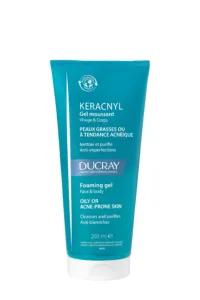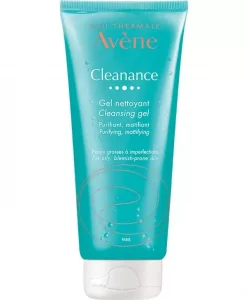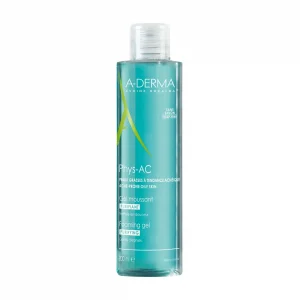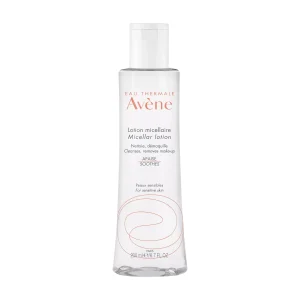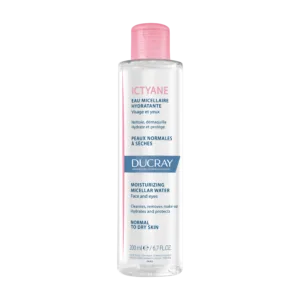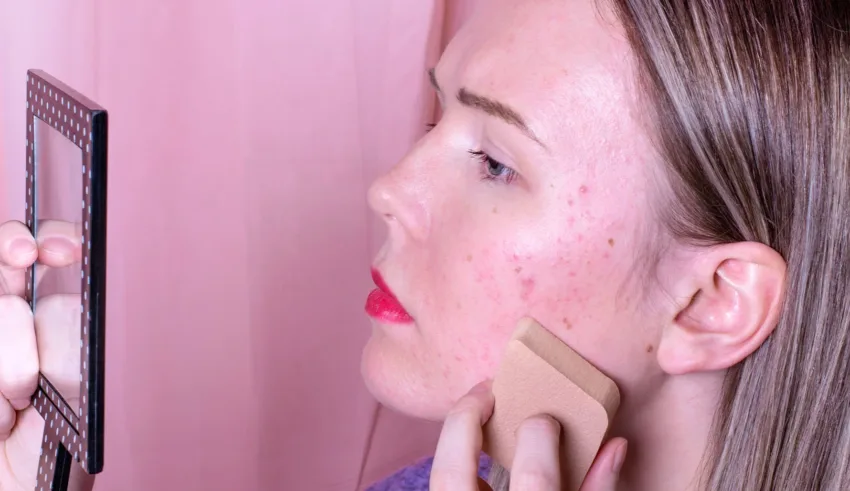
Pimples happen. When they do, you can turn to makeup to cover them up, whether it’s a monster pimple or an acne breakout. Many people use make-up to conceal acne. But while make-up can help hide acne, it can’t cure it. Make-up can even make acne worse, depending on the product you use and the way you apply it. It’s essential to understand the relationship between acne and make-up, as some products can potentially worsen breakouts.
Read on to find out how to conceal acne with make-up – the right way.
1- Cleanse your face
Before applying make-up, first cleanse your skin with a mild cleanser. Make sure you also clean any inflamed or irritated areas. Be very careful when washing your skin to avoid aggravating these pimples. Avoid rubbing your skin too hard, especially with a washcloth, and avoid using cleansers containing potentially irritating or drying ingredients, such as alcohol.
Need help choosing a cleanser? Check out our selection of the best facial cleansers for acne.
Ducray Keracnyl Foaming Gel
Eau Thermale Avène Cleanance Cleansing Gel
A-Derma Phys-AC Foaming Gel
2- Use a primer
Primer does what its name suggests: it prepares the skin for make-up.
In short, it helps create a more even surface, so you need less foundation. It also prolongs the hold of your foundation and prevents the rest of your makeup from clumping around imperfections.
Here’s how to apply it:
- Add a small amount of primer to a clean finger or make-up sponge.
- Use your fingers or sponge to spread the primer evenly over your skin, avoiding the eyes.
- Leave for a few minutes before applying your make-up.
3- Use a color-correcting concealer for acne
Concealer plays an important role in concealing acne. After all, the role of a concealer is to conceal.
Applying concealer before foundation can help make your makeup look more even. If you apply concealer after foundation, you run the risk of erasing parts of your foundation when you blend the concealer.
If your acne is distinctly dark, pink, or red, you may benefit from a color corrector.
Green concealers can help cover red imperfections or acne scars. If you have brown or black skin, opt for a peach, orange, or red concealer to hide dark imperfections and scars.
Color correctors come in stick, pencil, or liquid form that you can pour on or apply with a built-in applicator.
To apply:
- Apply the corrector to each imperfection or scar.
- Use your clean finger or a sponge to gently dab on concealer until it fades.
- Avoid rubbing concealer on your skin.
4- Use a foundation to cover acne
The foundation evens out the complexion and harmonizes all other products.
It comes in different forms: liquid, cream, compact, or loose powder. The choice of one or other of these products generally depends on your personal preferences, but it’s useful to bear the following points in mind:
- Liquid foundation is generally better suited to dry skin.
- Powder can set more visibly in fine lines and wrinkles.
- Powder or cream foundations may be suitable for oily skin.
To apply foundation :
- Start with a small amount.
- Blend with clean fingers, sponge, or brush until a light, even layer is achieved.
- Reinforce your coverage by applying one or more additional light coats, if necessary.
5- Finish with a setting powder
If you’ve used a loose or pressed powder for your foundation, you’re all set.
If you’ve used a liquid cream foundation, the application of a setting powder isn’t strictly necessary, but it can help prevent shine and prolong your coverage throughout the day.
You can buy translucent, loose powders specially designed to set your make-up, but mineral powder is an excellent alternative for fighting acne.
If you prefer setting powder, choose one that’s non-comedogenic.
To apply setting powder
- Swirl a brush through the powder until the bristles are lightly coated.
- Tap off any excess.
- Sprinkle the powder over your face in light circular movements.
6- Take it all off at the end of the day
Now you know how to conceal acne with make-up. But knowing how to remove it effectively is also very important to avoid aggravating acne flare-ups.
Keeping these tips in mind can help:
- Use a makeup remover containing enzymes or acids
When it comes to acne, some types of makeup removers are more effective than others at clearing pores. It’s best to use one containing enzymes or acids to achieve a chemical exfoliation that deep cleans pores.
- Wash your face twice
Even mineral or non-comedogenic make-up can contribute to clogged pores if left on the skin for too long.
Most makeup products leave behind debris that persist after just one wash. That’s why we recommend double cleansing, i.e. washing your face twice.
- Use a new washcloth every day
If you use a washcloth to wash your face, don’t use the same one twice or two evenings in a row. Once wet and air-dried, a towel becomes a breeding ground for bacteria, which you don’t want on your face.
Recommended make-up removers for acne-prone skin:
Eau Thermale Avène Micellar Lotion
Ducray Ictyane Hydrating Micellar Water
Things to remember
Whatever type of acne you suffer from, make-up can help conceal it. Just bear in mind that there are different types of products and techniques to suit your particular skin problems.
Acne-prone skin can be very sensitive. So try to be gentle when applying make-up and skincare products. Make sure your application tools are clean and that your products don’t contain ingredients that could trigger or irritate your acne. And if you suspect a product is the cause of your breakout, remove it.
For comprehensive advice on acne and make-up, we strongly recommend consulting a dermatologist. A dermatologist can give you further advice if your current acne treatment or skincare routine, from cleansing to make-up, doesn’t seem to be helping to reduce breakouts or acne severity.
Last Updated on March 26, 2024
